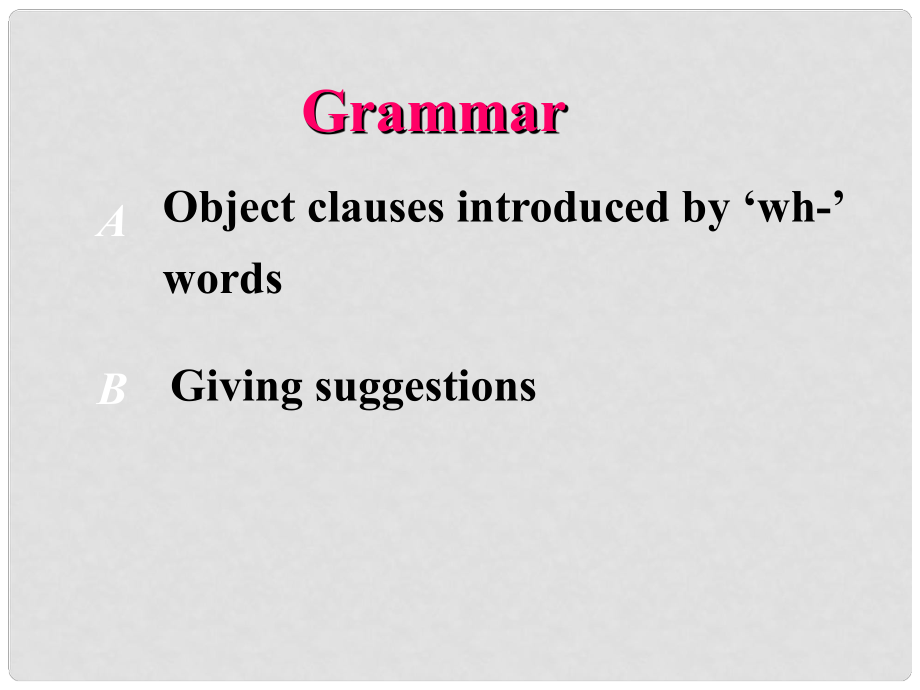《江蘇省句容市天王中學(xué)九年級(jí)英語(yǔ)上冊(cè) Unit 3 Teenage problems Grammar課件 (新版)牛津版》由會(huì)員分享��,可在線閱讀��,更多相關(guān)《江蘇省句容市天王中學(xué)九年級(jí)英語(yǔ)上冊(cè) Unit 3 Teenage problems Grammar課件 (新版)牛津版(29頁(yè)珍藏版)》請(qǐng)?jiān)谘b配圖網(wǎng)上搜索��。
1����、Object clauses introduced by wh- wordsABGiving suggestionsGrammarA 賓語(yǔ)從句可由連接代詞賓語(yǔ)從句可由連接代詞what, who, whom, whose, which等引導(dǎo)等引導(dǎo), 它們?cè)谫e語(yǔ)它們?cè)谫e語(yǔ)從句中可作主語(yǔ)、賓語(yǔ)����、表語(yǔ)和定語(yǔ)等從句中可作主語(yǔ)�����、賓語(yǔ)��、表語(yǔ)和定語(yǔ)等, 因此不能省略�。因此不能省略���。e.g. Do you know who will come this afternoon? 你知道今天下午誰(shuí)來(lái)你知道今天下午誰(shuí)來(lái) 嗎嗎�����?(作主語(yǔ)作主語(yǔ)) Did you hear what she said? 你聽(tīng)見(jiàn)她說(shuō)的話了嗎?
2�、你聽(tīng)見(jiàn)她說(shuō)的話了嗎����?(作賓語(yǔ)作賓語(yǔ))I dont know whose that is. 我不知道那是誰(shuí)的��。我不知道那是誰(shuí)的��。(作表語(yǔ)作表語(yǔ)) Could you tell me which gate we have to go to? 請(qǐng)問(wèn)我們得走哪個(gè)門(mén)��?請(qǐng)問(wèn)我們得走哪個(gè)門(mén)? (作作gate的定語(yǔ)的定語(yǔ)) 賓語(yǔ)從句可由連接副詞賓語(yǔ)從句可由連接副詞when, where, how, why等引導(dǎo)等引導(dǎo), 它們?cè)谫e語(yǔ)從句中作狀它們?cè)谫e語(yǔ)從句中作狀語(yǔ)語(yǔ), 不可省略�����。不可省略��。e.g. We didnt know when she would come back. 我們不知道她什么時(shí)候回來(lái)�����。我們不知
3、道她什么時(shí)候回來(lái)���。 Can you tell me how I get to the post office? 你能告訴我到郵局怎么走嗎?你能告訴我到郵局怎么走嗎? 說(shuō)明:說(shuō)明:含含how的詞組也可引導(dǎo)賓語(yǔ)從句����。主的詞組也可引導(dǎo)賓語(yǔ)從句�����。主要有要有how old, how many, how much, how long, how often, how far等�。等�����。e.g. Do you know how old he is��? 可用連接代詞或連接副詞引導(dǎo)可用連接代詞或連接副詞引導(dǎo)的賓語(yǔ)從句的動(dòng)詞或短語(yǔ)動(dòng)詞有的賓語(yǔ)從句的動(dòng)詞或短語(yǔ)動(dòng)詞有 see, say, tell, ask, answer,
4、 know, decide, find out, show, remember, choose 等�。等。e.g. We cant decide who should go to Beijing first. 我們不能決定誰(shuí)應(yīng)該先去北京��。我們不能決定誰(shuí)應(yīng)該先去北京�����。 Read the story below and find out who Father Christmas is. 讀下面的故事讀下面的故事, 弄清楚圣誕老人是弄清楚圣誕老人是誰(shuí)����。誰(shuí)�����。在引導(dǎo)詞上在引導(dǎo)詞上, 要將疑問(wèn)代詞或疑問(wèn)要將疑問(wèn)代詞或疑問(wèn)副詞變?yōu)檫B接代詞或連接副詞副詞變?yōu)檫B接代詞或連接副詞, 引導(dǎo)引導(dǎo)賓語(yǔ)從句��。賓語(yǔ)從句��。e.
5、g. Whose bike is this? Does anybody know Does anybody know whose bike this is?特殊疑問(wèn)句變賓語(yǔ)從句五注意特殊疑問(wèn)句變賓語(yǔ)從句五注意 賓語(yǔ)從句的時(shí)態(tài)應(yīng)與主句的時(shí)態(tài)保賓語(yǔ)從句的時(shí)態(tài)應(yīng)與主句的時(shí)態(tài)保持一致�����。持一致�。e.g. When the train will arrive? He asked me. He asked me when the train would arrive. 在語(yǔ)序上在語(yǔ)序上, 要將疑問(wèn)句語(yǔ)序改為陳述要將疑問(wèn)句語(yǔ)序改為陳述句語(yǔ)序���。句語(yǔ)序。e.g. Which one do you like bes
6��、t? She asked me. She asked me which one I liked best. 【 注意注意】疑問(wèn)句中主語(yǔ)之前的助動(dòng)詞若是疑問(wèn)句中主語(yǔ)之前的助動(dòng)詞若是 dodoes did, 變?yōu)橘e語(yǔ)從句時(shí)變?yōu)橘e語(yǔ)從句時(shí),要先要先將其去掉將其去掉, 謂語(yǔ)動(dòng)詞再根據(jù)時(shí)態(tài)作相謂語(yǔ)動(dòng)詞再根據(jù)時(shí)態(tài)作相應(yīng)的變化����。應(yīng)的變化。 特殊疑問(wèn)詞在句中作主語(yǔ)特殊疑問(wèn)詞在句中作主語(yǔ), 變?yōu)橘e語(yǔ)變?yōu)橘e語(yǔ) 從句時(shí)語(yǔ)序不變從句時(shí)語(yǔ)序不變(時(shí)態(tài)應(yīng)作相應(yīng)變化時(shí)態(tài)應(yīng)作相應(yīng)變化)。e.g. Who can answer the question? The teacher asked. The teacher asked
7�����、 who could answer the question. 特殊疑問(wèn)句變?yōu)橘e語(yǔ)從句后特殊疑問(wèn)句變?yōu)橘e語(yǔ)從句后, 用問(wèn)號(hào)用問(wèn)號(hào) 還是用句號(hào)完全取決于主句的句式還是用句號(hào)完全取決于主句的句式: 如主句為陳述句�����、祈使句如主句為陳述句�、祈使句, 句末就用句末就用 句號(hào)句號(hào); 如主句是疑問(wèn)句如主句是疑問(wèn)句, 句末就用問(wèn)句末就用問(wèn) 號(hào)���。號(hào)。e.g. I dont know when we shall start tomorrow. Do you know when we shall start tomorrow?把下列句子合并成一個(gè)句子�����。把下列句子合并成一個(gè)句子�����。1. He asked me. Wha
8���、t will your father do? _2. Do you know? Who are they waiting for? _3. She knows. The boy is a good boy. _He asked me what my father would do.Do you know who they are waiting for?She knows that the boy is a good boy.4. His father said. The earth goes around the sun. _5. She wasnt sure. Is Lily coming
9、? _His father said the earth goes around the sun.She wasnt sure if/whether Lily was coming.請(qǐng)請(qǐng)?jiān)谙铝性谙铝匈e語(yǔ)從句中賓語(yǔ)從句中填上填上所缺的連詞所缺的連詞(引導(dǎo)詞引導(dǎo)詞)���。1. The teacher didnt know _ broke the window. 2. Mr Green went out to see _ was happening. 3. Please tell me _ your father is.who whatwhat4. I really dont know _ I shou
10、ld do with these letters.5. Did you ask him _ we would leave?6. Do you know _ the lady lives? 7. Can you tell us _ you are late for class? 8. Could you tell us _ I can get to the zoo? whatwhen wherewhyhow9. Jenny wondered _ wallet it was. 10. I cant decide _ coat I should choose. 11. They asked me _
11��、 the book cost.12. Could you tell me _ students there are in your class? whosewhichhow muchhow many1. I dont know _ Mr. Green will come to see us. He will help us with our English. A. why B. when C. how D. where 中考鏈接中考鏈接2. We never know _ the old man is. They say he is a teacher A. what B. who C. wh
12���、ich D. where3. Do you know _? Im going to see him. Sorry, I dont know. A. where does Mr. Li live B. where did Mr. Li live C. where Mr. Li lives D. where Mr. Li lived 4. Where do you think _ he _ the computer? Sorry, I have no idea. A.;bought B. has���;bought C. did;buy D. does�����;buy 5. I dont feel very w
13����、ell. Mum asked me _ this morning. A. what is the matter B. what is wrong C. what was the matter D. what wrong was Why not?/Why dont you ?這兩種句型結(jié)構(gòu)常用于說(shuō)話人向?qū)Ψ竭@兩種句型結(jié)構(gòu)常用于說(shuō)話人向?qū)Ψ教岢鲆粋€(gè)建議��,意思是提出一個(gè)建議�,意思是“不不��?”�����; “為什么不為什么不��?”Why not?/ Why dont you ? 后面后面必須跟必須跟動(dòng)詞原形��。動(dòng)詞原形���。BWhy not go swimming?=Why dont you go swimming?
14、Why dont you go out for a walk? =Why not go out for a walk?WHAT /HOW ABOUT.? 這兩種句型結(jié)構(gòu)常用于說(shuō)話人向?qū)Ψ教岢鲆粋€(gè)建議��,意思這兩種句型結(jié)構(gòu)常用于說(shuō)話人向?qū)Ψ教岢鲆粋€(gè)建議�����,意思是是“怎么樣��?怎么樣���?”What /How about.后接后接名詞名詞/代詞或動(dòng)名詞代詞或動(dòng)名詞?eg. 1. His mother is a doctor. What about your mother? 2.Jimmy is good at swimming.How about you? 3.-I dont know what to do
15����、 this weekend. -What about going fishing?LETS. & SHALL WE.? 這兩種句型結(jié)構(gòu)也常用于說(shuō)話人向?qū)Ψ教岢鲆粋€(gè)建議����,意這兩種句型結(jié)構(gòu)也常用于說(shuō)話人向?qū)Ψ教岢鲆粋€(gè)建議,意思是思是“我們做我們做吧吧/好嗎�����?好嗎��?” 后接后接動(dòng)詞原形動(dòng)詞原形���。eg. Lets go to the cinema together. = Shall we go to the cinema together ?請(qǐng)關(guān)注下面兩句:請(qǐng)關(guān)注下面兩句:Lets walk to school , shall we?Let us walk to school , will you?Thank you!
 江蘇省句容市天王中學(xué)九年級(jí)英語(yǔ)上冊(cè) Unit 3 Teenage problems Grammar課件 (新版)牛津版
江蘇省句容市天王中學(xué)九年級(jí)英語(yǔ)上冊(cè) Unit 3 Teenage problems Grammar課件 (新版)牛津版

